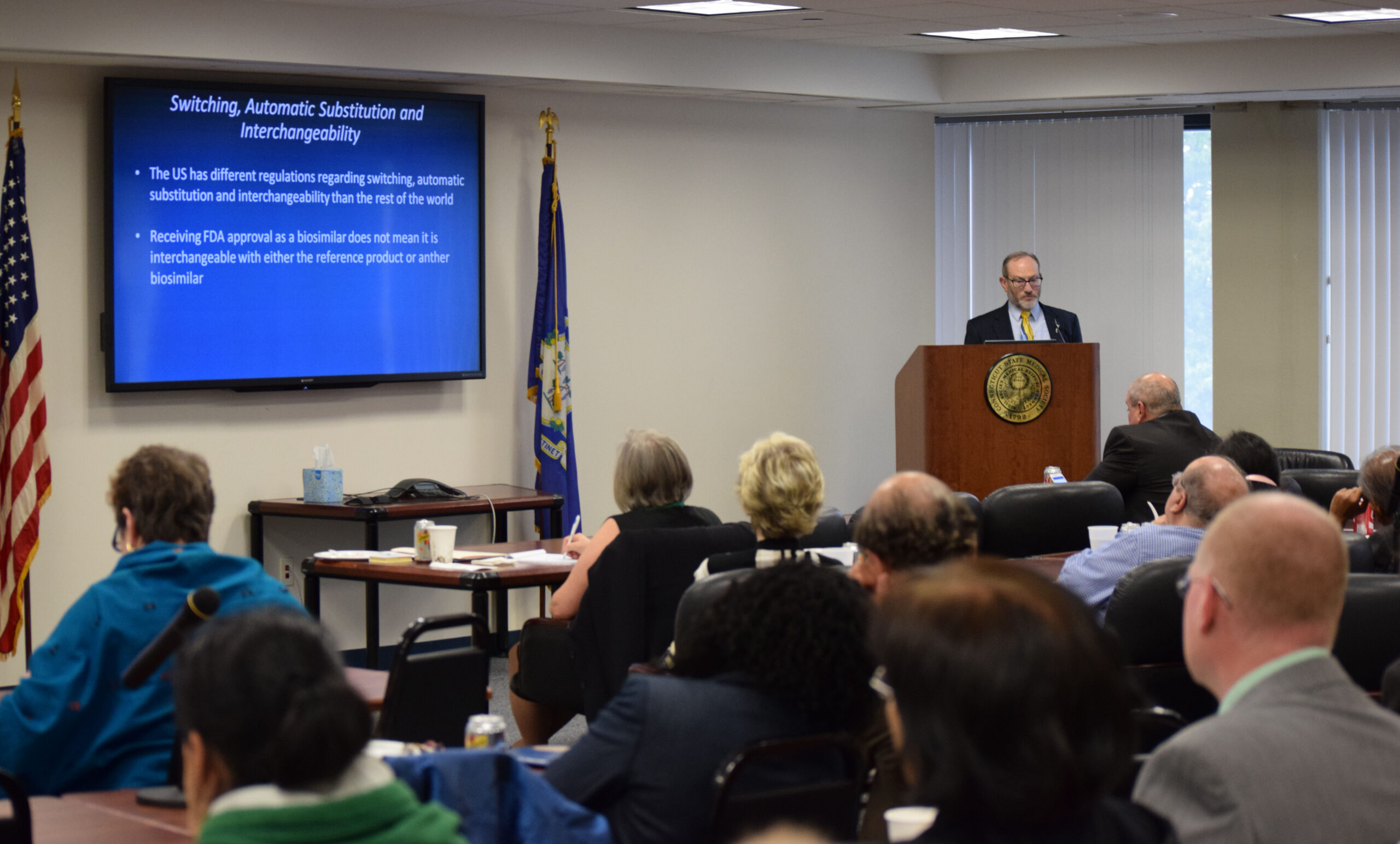On May 30th, in partnership with the Connecticut State Medical Society, ASBM presented a 2-hour Continuing Medical Education (CME) course entitled “Biosimilars: New Choices, New Challenges”.

The event began with remarks by CSMS President Jeff Gordon, MD, who is Medical Director of Hematology-Oncology Services at Day-Kimball Hospital in Putnam, CT. Dr. Gordon emphasized the great excitement about biosimilars among physicians, and the importance of physician engagement as biosimilar policy is being created. As an example, he cited CT House Bill 7118 (HB 7118), which recently passed the Connecticut House of Representatives with the support of CSMS. Like similar laws enacted in 35 states and Puerto Rico, HB 7118 would permit Connecticut pharmacists to substitute an FDA-approved “interchangeable” biosimilar, provided they inform the prescribing physician within 72 hours of the substitution. Physicians need to know what medicine the patient receives in order to better monitor their treatment, explained Dr. Gordon.

ASBM Chairman Harry L. Gewanter MD then presented. He began with a brief recap about what makes biologics different than small-molecule drugs, and what makes biosimilars different from chemical generics. These fundamental differences including greater size and complexity and potential for immune responses, Dr. Gewanter explained, necessitate a different regulatory approach than for generic drugs. For example, he highlighted how regulators including the World Health Organization (WHO) and the U.S. Food and Drug Administration (FDA) have proposed distinct naming for all biologics, including biosimilars, by use of a four-letter suffix appended to the nonproprietary name. This would ensure clear product identification, lessening the chance of inadvertent substitution, ensuring the accurate attribution of adverse events, and promoting manufacturer accountability for their products.
Dr. Gewanter shared results from ASBM’s surveys of biologic prescribers in 12 countries, showing strong support for distinct naming among respondents, ranging from 66%-94% depending on the country. U.S. pharmacists surveyed shared this sentiment, with 68% supporting distinct naming.
 Dr. Gewanter discusses biosimilar labeling in the U.S., including what information physicians and pharmacists consider important to include.
Dr. Gewanter discusses biosimilar labeling in the U.S., including what information physicians and pharmacists consider important to include.
Dr. Gewanter also addressed the issue of product labeling, sharing survey data from US physicians and pharmacists which revealed these practitioners want more informative, transparent labeling than is currently required by the FDA, especially regarding indication extrapolation and whether or not the biosimilar is interchangeable with its reference product. He offered Health Canada’s labeling guidance as an example of suitable transparency to which other regulators including the FDA should look as a model.

Bringing things full circle to Dr. Gordon’s remarks about HB 7118, Dr. Gewanter shared ASBM survey data regarding prescriber attitudes on substitution. Between 77%-89% of physicians in the 12 countries surveyed consider it “very important” or “critical” that they be notified in the event of a biosimilar substitution. This requirement is a key provision in HB 7118 and in the biosimilar substitution laws enacted by 35 states and Puerto Rico.

Next, Andrew Spiegel, Executive Director of the Global Colon Cancer Association, an ASBM Steering Committee Member, presented the patient perspective on biosimilars. Mr. Spiegel spoke of the great enthusiasm patients have for biosimilars, citing the role biologics have played in extending the lives of colorectal cancer patients. Mr. Spiegel also emphasized the need for the biosimilar approval process be transparent to patients and physicians, and for manufacturers to provide ample data demonstrating the safety of their products. This, Mr. Spiegel argued, will serve to increase patient and physician confidence in biosimilars.
 Andrew Spiegel explains how data and transparency are the key to building patient and physician confidence in biosimilars.
Andrew Spiegel explains how data and transparency are the key to building patient and physician confidence in biosimilars.
Mr. Spiegel then spoke on the subject of Non-Medical Switching (NMS). NMS is when an private insurer, government payer, or other third party switches a patient’s medicine for reasons other than the patient’s health and safety. Mr. Spiegel outlined a number of ways patients can be forced to switch therapies, including raising out of pocket costs (coinsurance, copay, etc.) for a patient’s current therapy, formulary design changes, changing tiers, and blocking the use of co-pay cards.
Finally, Mr. Spiegel discussed the need for treatment decisions, including the decision to switch to a biosimilar, to remain between a patient and their physician. Many patients struggle for years to become stable, trying several different medications. Changing a patient’s medicine can result in loss of this hard-won stability, Spiegel explained. To highlight these concerns, he showed showing this video from ASBM Member Kathleen Arntsen, President and CEO of Lupus and Allied Diseases Association.

The session concluded with a Q&A period.
